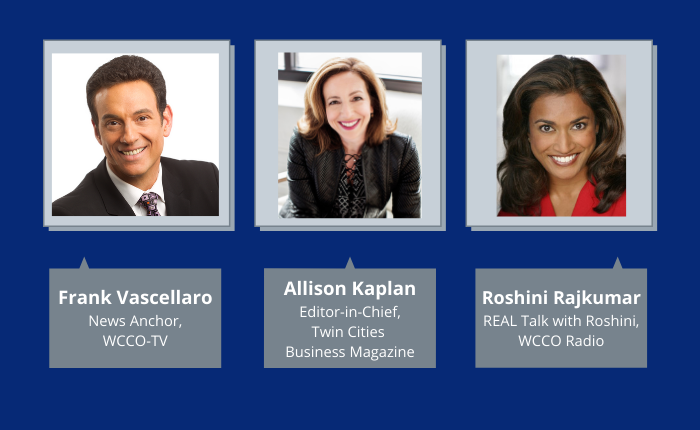As we mark one year since the start of the pandemic – and a very eventful news year – we wanted to take time to reflect on what has changed and what has remained the same when it comes to journalism and media relations. We reached out to some friends in the media – WCCO-TV anchor Frank Vascellaro, Twin Cities Business Magazine’s Editor-in-Chief Allison Kaplan and executive strategist, crisis coach and host of REAL Talk with Roshini on WCCO Radio, Roshini Rajkumar to ask them about their experiences over the last year. In our discussions, we found five common themes that align with what we’ve also experienced working closely with journalists over the last 12 months – and that can be applied to fields beyond journalism and media relations:
Read the room
- This is something we’ve known all along, but it became more important than ever in 2020 and now in 2021 to “read the room” and decide when is the right time to pitch a story (or make any public announcement). With the continuously breaking news of the pandemic, the election and insurrection and the social unrest that followed the killing of George Floyd, newsroom and staff were stretched thin with all hands on deck. A pitch regarding an event a month down the road or new product would not only be ignored but could be seen as insensitive during breaking news cycles. Reading the room also means knowing the landscape and who you are pitching. As Allison Kaplan, Twin Cities Business Magazine’s editor-in-chief says, “Provide some context. Why does it matter now? What’s happening next? Also know what we’ve already written on the topic.” Read the room = do your research.
Tell your best story and why it is important
- How does a pitch (or idea or new product) go beyond your company or organization and impact the community? In this tight news landscape, it’s important to keep this in mind. WCCO-TV’s Frank Vascellaro says, “Pitches that work the best are not self-serving, but community-serving. You should pitch an idea that has a broader impact that affects the community than a narrow topic that only benefits the company. How does your company or client help people? We are looking for innovations and solutions that help people and the community in general.” WCCO Radio’s Roshini Rajkumar agrees: “The best PR professionals pitch specifically. From my past life in TV news as a reporter, to my current work as a talk show host and commentator for other outlets, the best PR pitches are the ones that know my style, understand how I cover things on my show, and don’t send blanket press releases.”
Make it easy as possible for everyone
- Everyone is stretched thin more than ever so providing all the information a journalist would need to know and use for a story is crucial. “We need photos with every story we post, so having assets available can expedite the process,” Kaplan says. “It may seem small, but it’s vital in our visual world today.” Making things as easy as possible for the reporter/producer to do their job will help get your story covered.
Relationships are key
- Even in this new virtual world we are living in, it is still important to develop relationships with media (and your co-workers, customers, etc.). Be prompt, kind and helpful. “Developing relationships with media is very important,” Vascellaro says. “We are more apt to do a story when it comes from a PR professional we have worked with, respect and trust that it is a newsworthy story idea rather than a promotional pitch.”
In this 24–7‑365 world, we’re all human
- More than ever, the news cycle is moving fast and furious. “Social media has really changed traditional journalism,” Rajkumar notes. “The seemingly 24–7‑365 nature of things means there’s not enough time for news gathering, discernment before publication or broadcast and reflection.” Remember there are human beings behind the emails and social media, in front of and behind the cameras (and in front of and behind all those webinars we’ve been watching lately). So, while it’s important to do our best work, know that there is so much more happening behind the scenes and we need to be kind to one another.
The world is a different place than it was a year ago in so many ways. As challenging as this past year has been, it taught us a lot about how we work, how we interact and who we are as people. Hopefully we can all take away pieces that will make us better professionals – and people – moving forward. As we take time to pause and reflect on the past year, what lessons have you learned that you plan to carry with you in 2021 and beyond?
Shelli Lissick and Megan Anderson from our team also contributed to this post.

